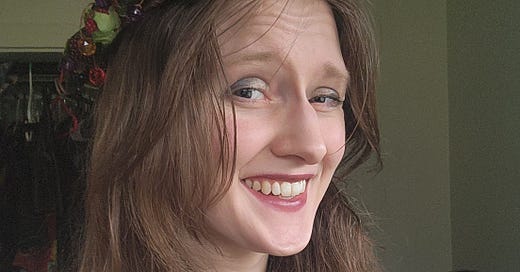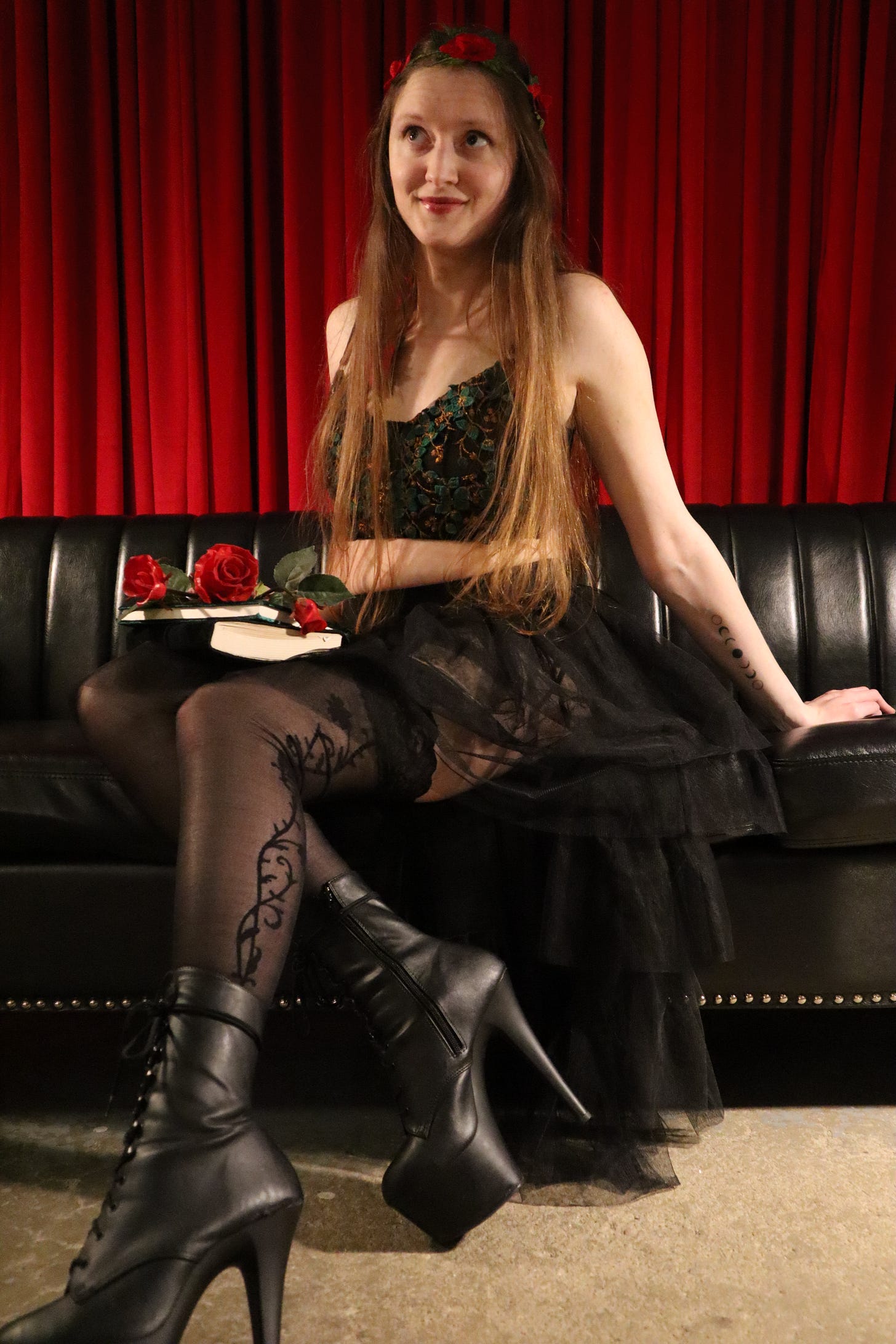Names are witchcraft. Let me explain.
Long before I ever knew I was going to be a witch, witchcraft called to me.
An early clue? My love of names and their meanings. The intention put behind them is nothing short of magickal1 to me.
(This post contains affiliate links. I earn a small commission on Bookshop.org links used to purchase books. All Microcosm titles I recommend here, if purchased, benefit me financially because I am employed as an author and editor for Microcosm. Microcosm books are not included in my Bookshop lists for this reason. All that being said, I only recommend books I believe in. I use these recommendations as one small way to make my editing/writing work as sustainable as possible. Thanks for reading!)
When I was a baby, my pastor performed Christian baby dedication rituals with an added twist, sharing a name meaning and creating a blessing out of some part of the Christian Bible related to the child’s eponym. My full birth name meant “glowing white” and “consecrated to God.” Because of those meanings, the pastor chose my Bible verse from the book of Daniel, and it was about spiritual wisdom as light.
In short, I was destined to be a name nerd.
Fast forward many years, and as a teen, I spent hours on Nameberry.com, compiling long lists of names I loved and their meanings. This website also had a blog that introduced me to the witchy side of naming via a regular contributor: the late K.M. Sheard who wrote the stunning Llewellyn’s Complete Book of Names: For Pagans, Wiccans, Druids, Heathens, Mages, Shamans & Independent Thinkers of All Sorts Who Are Curious about Names from Every Place and Time.
My heart! I was a fundamentalist Christian at the time, and I didn’t know how to place my love for this witchy resource and K.M. Sheard’s general blogging insight. Of particular note was one of Sheard’s posts on Nameberry: “Meanings of Names: Ever hear of Homophony?” In this post, Sheard shares a common naming practice found in the Bible: “homophony…is the principle of choosing a name because it sounds like something which the bestower wants to commemorate.”2
If that doesn’t sound like spellwork3 and intention,4 I don’t know what does.
And as a disabled person and someone with religious trauma, I have taken so much healing from the practice of making meaning for myself from my given name but also by considering other names for myself and for characters I write. Some witches even select a new name when they begin practicing.5
Whether you are reclaiming a name, naming a child or a pet, or renaming yourself, consider the following words of ritual for this practice.
[New name], I bestow this name on you, casting intentions of love and joy and [meaning] for you. May this name be transformational, open to the ways you will grow and change. May this name invoke the power of the love of all who have gone before, all who support you in life now, and all who will come after. You are magic.
///
The fact of the matter is, I’ve done this naming ritual…recently.
For a long time—given the number of changes I’ve gone through in the last several years and the realizations I’ve had about who I’ve always been—I’ve been thinking about changing my name.
Now, that time has come.
With the aforementioned naming encyclopedia in hand, I began compiling a list of options. A clear winner emerged: I now go by Ivy. Here’s why I chose it:
I love the color green and am known to prance about in leafy flower crowns, as well as bedazzle any surface I want with leaves—from my painting and art journals to my dance choreo costumes to my work-from-home desk. Hell, my office is even ivy green.
I wanted to exercise my autonomy as an exvangelical, queer, and witchy human. I wanted something that was simultaneously femme and a hair enby-coded. (She/they all the way!)
I love how ivy looks—always have.
One of my earliest childhood special interests was the Batman universe, and I have always loved the aesthetic and vibes of Poison Ivy. As an adult, I’ve come to love her queer story arc. On Bookshop, I have a graphic novels list that features a lot of iterations of this Ivy.
Ivy is an evergreen plant. As a femme who grew up in the woods, I was always comforted by tall evergreens, and ivy has a tenacious (if invasive) way bringing its evergreen-ness, well, everywhere. I also find the term evergreen to be a word that summarizes my values. During my Christian years, I loved Audrey Assad’s “Evergreen,” and there are still some resonate themes in this song for me.
I love how The Complete Book of Names describes ivy: “The name of the evergreen vine, frequently found growing on old buildings and trees” that “has long had association of eternal life and rebirth” and is “said to be potent at warding off negativity wherever it grows or is placed.” If that doesn’t describe my queer, disabled, witchy, and exvangelical journey, I don’t know what does.
In Plant Witchery, Juliet Diaz paints a beautiful picture about ivy—that its “essential propert[y] [is] new beginnings,” it “inspires us to persevere and to try,” and it “teaches us that change isn’t always a bad thing.” My journey toward autonomy and healing has included and will continue to include a cycle of deaths and rebirths—change. And the moment I accepted that was the moment I started becoming truly happy and at home within myself.
The process of choosing a new name is an exercise adjacent to the idea of found family. It’s rooted in autonomy and self-love.
And if that love isn’t spiritual,6 isn’t magickal, isn’t divine,7 I don’t know what is.
LET ME KNOW IN THE COMMENTS: If you have a chosen name, why did you choose it?
In Wonder,
Ivy Zeller (she/they)
Thanks for reading! I’m a queer, disabled writer/editor, and what I do is made possible by readers like you. You can support me in this journey in a number of ways:
I consider witchcraft to be “spicy placebo,” and my practice is very secular. I love the definition of magick laid out in this article: “action taken to bring about internal transformation or external change.”
K.M. Sheard, “Meanings of Names: Ever hear of Homophony?” October 13, 2013, Nameberry Blog. Nameberry.com <“https://nameberry.com/blog/meanings-of-names-ever-hear-of-homophony>
In Disabled Witchcraft, my book, I define spells as “words (whether written, spoken, or thought) that are intentionally and carefully chosen to direct energy toward transforming yourself or a situation or system you are in.”
In Disabled Witchcraft, my book, I define intention as “your desired goal for a ritual and/or a guiding idea to carry with you before, during, and after the ritual.”
Ceridwen, “5 Tips for Choosing the Perfect Witch Name for Your Spiritual Journey,” accessed September 15, 2023. Craft Of Wicca. CraftOfWicca.com <https://craftofwicca.com/choose-the-perfect-witch-name/>
When I describe or experience any tool/practices as spiritual, I want to acknowledge that that is not everyone’s experience. Any practice/tool I share is meant for all, regardless of spiritual label (or lack of label) or whether you experience these tools as spiritual or as some other adjective(s). Labels, while helpful in describing our experiences, are ultimately insufficient, so I want to hold space for that tension here.
My understanding of how god expresses godself is expansive. Basically, I conceive of spirituality as our experience with divine love and connection. But even that feels a little religious-y. Put another way, I believe spirituality is the place where we as individuals and communities connect with the “force of love that holds up the universe” (in words sometimes attributed to Julian of Norwich), whether we conceive of that love as divine or as the love shared between fellow humans/other creatures or some combination of both loves. It is the place within our bodies and our communities where we find love and connection with all who have come before and who will come after.






Congratulations, Ivy! What an awesome name 😊 I love how much time and effort you put into considering this transformation--as someone who works as a guide for both adults and expectant parents looking for the perfect name, I definitely see the differences in considering a name for yourself and who you want to be versus for an idealized someone else.
What a bold and beautiful and resonant choice, Ivy! You've so clearly put a lot of care and passion into the process of choosing. I'm especially glad I got to read this today, as I'm starting to collect and research names for the baby I'm expecting in a few months! Thanks for sharing!